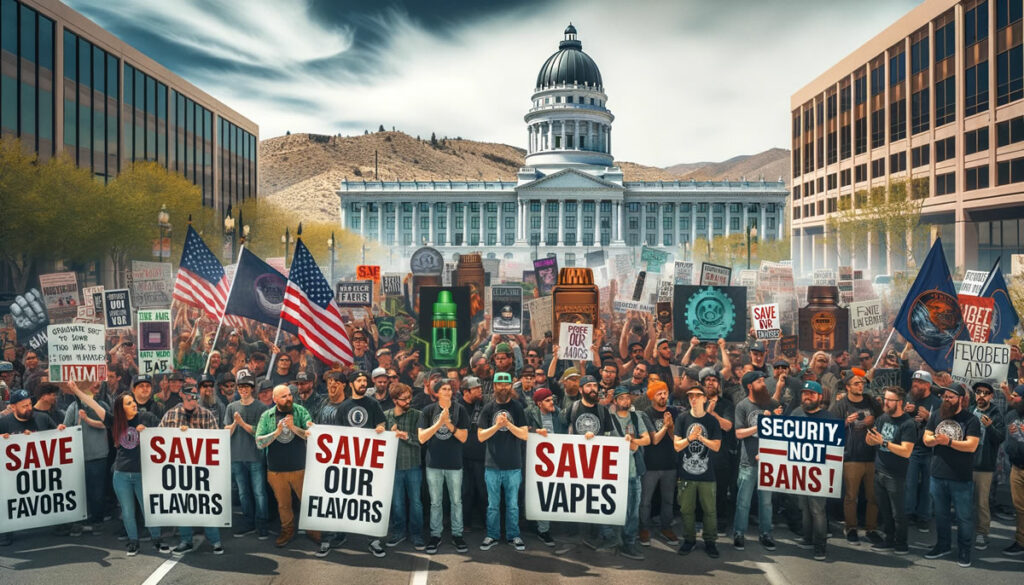The Utah State Capitol echoed with the chants of vape enthusiasts and shop owners on Tuesday, as they rallied against proposed legislation that could potentially ban the sale of flavored vapes in the state. The protest, organized by the Utah Vapor Business Association, aimed to persuade lawmakers to reconsider the restrictive measures outlined in SB61, the Electronic Cigarette Amendments bill.
The Proposed Legislation and Its Impact
SB61, sponsored by Senate Minority Assistant Whip Jen Plumb, D-Salt Lake City, seeks to address the growing concern over youth vaping and nicotine addiction. The bill would prohibit the sale of flavored vape products and electronic cigarette products that have not received market authorization from the federal Food and Drug Administration (FDA).
Plumb, a physician working in overdose death prevention, cited local data from the 2023 School Health and Risk Prevention (SHARP) survey to highlight the issue. According to the survey, nearly 69% of school-age children prefer sweet or alcohol-mimicking vape flavors, while only 2% liked tobacco flavors.
“I know that sounds very nannyish. I know that sounds very patriarchy, very shaking of the finger,” Plumb acknowledged. However, she emphasized that she doesn’t know anyone with nicotine dependence who wouldn’t wish to undo their decision to start the habit at a younger age.
Businesses Fear Impact on Livelihoods
The proposed legislation has sparked concerns among vape shop owners and advocates, who fear it could effectively put them out of business. Rep. Matt MacPherson, R-West Valley City, expressed concerns about the potential impact on businesses that were established after the state passed laws allowing flavored vapes to be sold only in establishments where only people over 21 years old could access them.
Beau Maxun, a representative from the Utah Vapor Business Association, criticized the bill, arguing that it incentivizes a monopoly for big tobacco companies. He claimed that vape shops exist to help consumers transition away from traditional cigarettes.
“I will sit here in front of you right now and tell you that if this committee had the courage to ban all tobacco products, I would walk away from every single one of my businesses,” Maxun stated. “But the reality is that’s not what this committee is here to do.”
Calls for Enhanced Security Measures
Protesters also criticized the bill sponsors for not considering their proposals to enhance security measures to prevent underage access to vape products. They argued that banning flavored vapes may not be the most effective solution and could potentially drive customers towards unregulated or black-market alternatives.
Supporters Argue for Public Health
Despite the protests, the bill garnered support from some quarters, including the Utah Retail Merchants Association. Dave Davis, the association’s president, assured that his organization did not represent big tobacco companies and supported the bill as it would level the playing field between general retailers and tobacco specialty shops.
“If you have a business model that’s built on Captain Crunch and bubblegum, then maybe you have to reevaluate the business model,” Davis stated, emphasizing the need for responsible business practices.
As the debate continues, the outcome of SB61 will have far-reaching implications for both public health and the vaping industry in Utah. While proponents argue for the protection of youth from nicotine addiction, businesses fear the potential economic consequences of restricting flavored vape sales.
- UK Announces Mandatory Vape Tax and Duty Stamps from 2027 - February 10, 2026
- Sri Lanka Travel 2026: Total Ban on Cigarettes & Vapes - February 5, 2026
- NY Tax Proposal: Hochul Targets ZYN with 75% Levy - January 29, 2026


